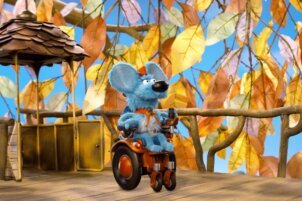Microaggressions are unfortunately something many people are familiar with, the disability community included. Constantly navigating uncomfortable conversations with strangers, and sometimes even people close to us. But what happens when constant verbal combat becomes too much? “Don’t Take This the Wrong Way” explores this question, telling the story of how this emotional toll leads to unraveling for the main character, Darcy.
At the beginning of the film, viewers join Darcy in what seems to be a typical errand to the grocery store. She is going about her shopping and minding her own business, when suddenly she is stopped by another customer who starts with the classic line, “I hope you don’t take this the wrong way…” and continues an attempt of a “compliment” of how well Darcy walks with her prosthetic leg. These frustrating interactions where strangers make assumptions about Darcy continue throughout the film, being “disabled enough” to receive comments on how well she walks, while simultaneously being scolded for NOT being “disabled enough” to use an accessible parking spot. Worn down from these constant microaggressions, she arrives home to find a devastating note that her husband has left her, pushing Darcy further to her breaking point. After one more unsolicited comment from a neighbor, Darcy’s reality shifts as she begins to envision violent things happening to those who try to fit her into a perfect box of who she’s supposed to be.
This film was produced as part of this year’s Easterseals Disability Film Challenge (EDFC), an annual five-day competition, founded by Nic Novicki, in which filmmakers must create original three-to-five minute films based on a different theme each year, with this year’s theme being “thriller.”
Co-director, writer, co-producer, and main actor, Rachel Handler, a 2020 Disability Belongs™ Entertainment Lab alumna, explores themes of perception vs. reality through “Don’t Take This the Wrong Way.”
“How we are perceived can haunt us in ways that leave us questioning our reality,” Handler explains. “As a woman with a physical disability, I’ve heard the phrase ‘Don’t take this the wrong way, but you walk so well!’ over and over in many iterations. I like to show my prosthetic leg. When I cover it or try to hide it, I feel like I’m hiding a part of myself that I’m proud of. But in sharing this part of myself, I become a spectacle; a thing to be ogled at and commented on. I want this film to remove that burden from the lives of all people with disabilities”.
One powerful line from the film that will likely resonate with many viewers, is when Darcy exclaims, “People are always telling me what to do, how to be…It’s bullshit because no matter what I do, or how I dress, or what I hide or don’t hide, I’m still me! Just me.” This powerful statement made me think of past experiences I’ve had where it seems no matter what I do, I just didn’t seem to belong. Disabled or not, viewers who have experienced power struggles with autonomy and belonging will likely relate to Darcy in this feeling of “wrongness”. Particularly for viewers who are neurodivergent and only found out later in life, many of whom spent years asking “what is wrong with me” to never seem to find an answer. That answer of course is that nothing is “wrong” with each individual, but society is often centered around non-disabled ways of being. This goes for Darcy as well.
Society as a whole is slowly catching up to seeing and getting used to disabled individuals living their fully authentic lives. Through films like “Don’t Take This the Wrong Way” and other disability advocacy movements, hopefully soon the world can grow beyond awareness, to acceptance.
This review was written by Disability Belongs™ Marketing and Communications Fellow Gwen Cotten and edited by Disability Belongs™ Entertainment and Media Fellow Aaron Potter.






